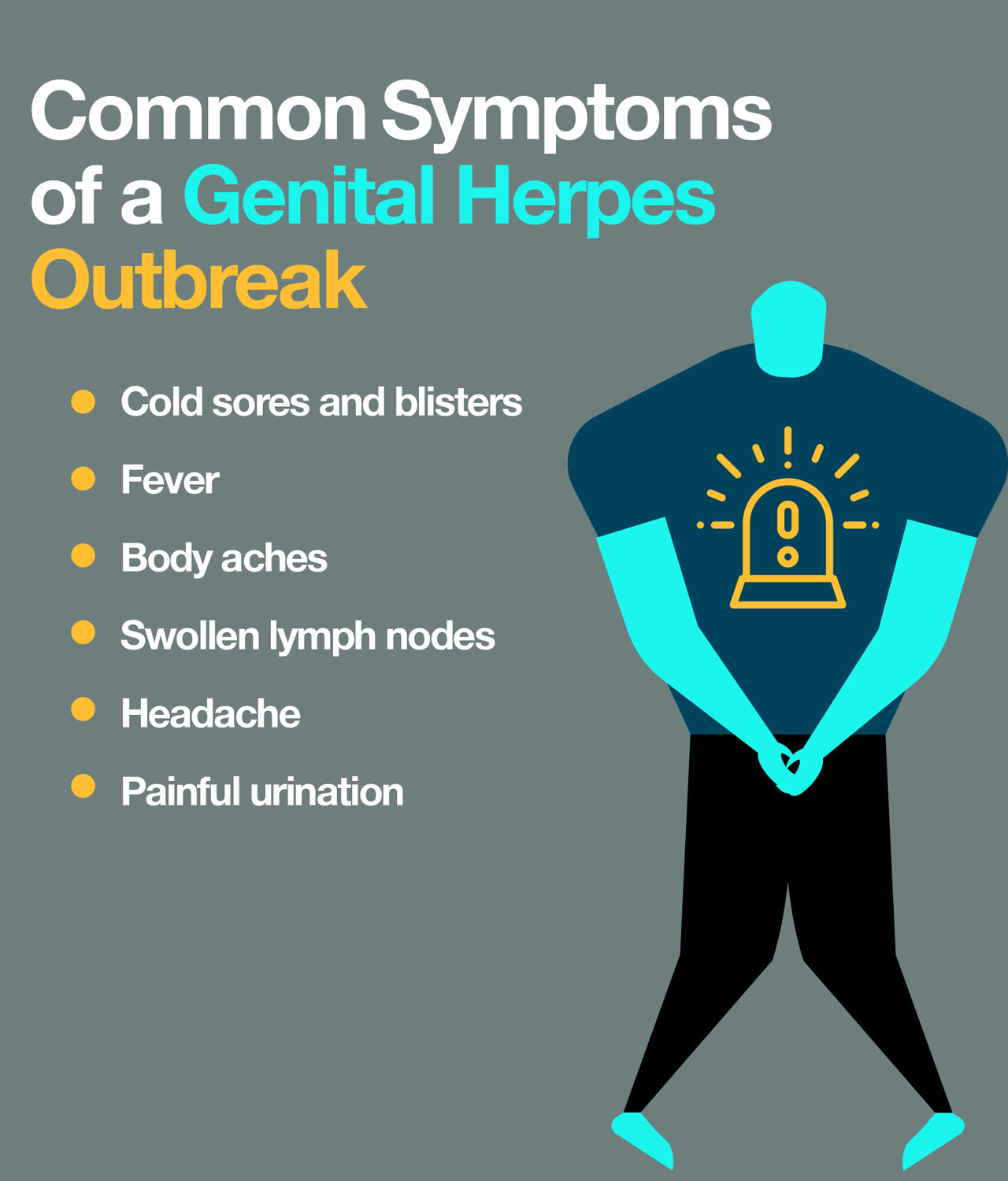Genital Herpes: Symptoms, Treatment and Risks
 By: by Amino Science
By: by Amino Science

Genital herpes is a sexually transmitted infection, or STI, meaning it is spread through sexual contact including vaginal, anal, and oral sex. Genital herpes is not the name of the virus, but rather the common symptom. The virus that causes herpes is called herpes simplex, and there are two types of the virus. One type of the virus causes genital herpes while the other type causes oral herpes.
Both genital herpes and oral herpes are common in the United States, and many people who contract the virus don’t realize that they have contracted it. Herpes often does not present with symptoms, so many people spread the virus without realizing that they have it themselves. Even if genital herpes does not present with symptoms, it can still be spread to others and can increase the risk of developing additional health problems for those infected, including an increased risk of contracting other sexually transmitted diseases such as HIV.
Types of Herpes
There are two types of the herpes simplex virus, type 1 and type 2. Each causes outbreaks of cold sores or blisters and is spread through contact. The virus tricks the immune system by interfering with the process that instructs immune cells to recognize and destroy foreign invaders.
HSV-1
The herpes simplex virus type 1, or HSV-1, causes oral herpes. Those infected with HSV-1 may break out in cold sores or fever blisters around the mouth. Sores may also appear inside the mouth, on the face, or even inside the nose. HSV-1 is usually spread through skin-to-skin contact including kissing. Other common ways of contracting the virus include sharing personal items such as:
- ChapStick or lipstick/lip gloss
- Cups/beverages
- Utensils
- Toothbrushes
HSV-1 is very common in the United States. According to the American Sexual Health Association, approximately 50% of adults in the U.S. have oral herpes. Most oral herpes cases can be attributed to HSV-1.
HSV-2
When people refer to genital herpes, they are referring to the herpes simplex virus type 2, or HSV-2. While HSV-1 causes cold sores and blisters around the mouth, HSV-2 causes cold sores and blisters around the genitals. Both men and women contract HSV-2, and both can spread the virus to other people. HSV-2 may be spread through the following ways:
- Vaginal sex
- Anal sex
- Oral sex
- Skin in the genital area
HSV-2 can be spread at any time, even if there is no outbreak of herpes at the time of sex. While HSV-2 is responsible for most cases of genital herpes, some cases are caused by HSV-1. Sometimes, a person infected with HSV-1 might spread the infection from his or her mouth to their partner’s genitals through oral sex. So it is possible to contract genital herpes from both types of the herpes virus.
Like oral herpes, genital herpes is common in the United States. According to the Centers for Disease Control and Prevention (CDC), more than one out of every six people between the ages of 14 to 49 years old have genital herpes.
Genital Herpes Symptoms
One of the reasons that herpes viral infections are so common is because they often occur with no symptoms or symptoms that are mild and mistaken for other skin conditions. With many people not realizing they have the virus, it is easily spread from person to person. According to the American Sexual Health Association, as many as 90% of people infected with genital herpes in the United States do not know that they have it.
The most typical symptom of genital herpes is blisters or cold sores that appear on or around the genitals. These genital sores may break open, leaving painful open sores that can take weeks to heal. This initial outbreak is often accompanied by other symptoms of genital herpes, including:
- Fever
- Flu-like symptoms
- Body aches
- Swollen lymph nodes
- Headache
- Painful urination
According to the CDC, this first outbreak of genital herpes usually lasts longer than subsequent outbreaks. Not everyone will have an obvious outbreak initially. Some people have a mild first outbreak and often don’t even realize that they have herpes. They may attribute their symptoms to a rash, insect bite, ingrown hairs, pimples, yeast infection, or jock itch.
Some people have an initial outbreak within days of contracting the virus. Others may go weeks, months, or even years before they have any symptoms that suggest a herpes infection. Recurrent outbreaks of genital herpes are common, though varying amounts of time may pass between outbreaks. The symptoms of an outbreak and number of occurrences differ from person to person. Most people typically have four to five outbreaks a year of genital herpes. The average for oral herpes, on the other hand, is less than one per year.

Genital Herpes Treatment
There is no cure for genital or oral herpes. There is also no vaccine to prevent infection, though clinical trials are underway. With no vaccine and no cure, millions of people worldwide are left to deal with the infection and its symptoms. So what kinds of herpes treatments are available?
Antiviral Medication
While genital herpes cannot be cured, the symptoms of herpes can be managed with the use of antiviral medications. Antiviral medications may help prevent genital herpes outbreaks or reduce the number of outbreaks so they occur with less frequency. Suppressive therapy such as antiviral medications may also reduce the risk of spreading the virus to others. However, it’s important to note that even if one is on antiviral medications and has not had an outbreak in a significant amount of time, it is still possible to spread the herpes virus to others.
Antiviral Amino Acids
A natural treatment option for genital herpes is the essential amino acid L-lysine, or lysine, which has been shown to help prevent repeat outbreaks. Amino acids form protein, which the body needs to build tissue and muscle and make the chemicals needed for proper brain and organ function. In addition to the plethora of health benefits amino acids offer, lysine has been shown to contribute to an antiviral response in the body for the flu virus as well as the herpes simplex virus.
Researchers have spent decades studying the potential antiviral effects of lysine. The journal Dermatologica published a study about the use of lysine therapy for the herpes simplex virus in 1978.
Lysine is an over-the-counter supplement that many people have found useful in treating herpes outbreaks and cold sores. It is better to take lysine as part of a balanced essential amino acid supplement rather than as a single supplement in order to get the beneficial effects of lysine while maintaining a good ratio of all the essential amino acids in the blood.
Genital Herpes and Pregnancy
It is possible for a pregnant woman who has genital herpes to spread the virus to her baby. When genital herpes is spread to a baby, it is called neonatal herpes, and it comes with serious risks and potential complications. Herpes may be passed from the mother to the baby during the pregnancy, or it may happen at the time of delivery. The closer to delivery that a woman acquires genital herpes, the greater the risk of her baby developing neonatal herpes. If a baby is infected with the herpes virus shortly after birth, the results are usually severe and potentially fatal for the infant.
Genital Herpes and HIV
Studies published in medical journals, such as AIDS, have shown that having genital herpes increases the risk of contracting HIV. This is because herpes causes painful sores that open the skin around the genitals. Open wounds, such as herpes sores, increase the chances that HIV will find a way into the body. HIV seeks certain cells as an entryway. The cells it targets are called CD4 cells. Those with genital herpes have an increased amount of CD4 cells. So even if there is no active outbreak of genital herpes at the time of intercourse, the chances of contracting HIV are still higher for those infected with the genital herpes virus.
Preventing Genital Herpes
Since there is no vaccine and no cure available for genital herpes, taking preventative measures is critical to avoid contracting the HSV-2 virus. The CDC recommends men and women take the following actions to protect themselves from genital herpes infection.
- Use latex condoms. Latex condoms cannot completely eliminate the risk of contracting genital herpes, but they can reduce the risk.
- Abstain. If you are not currently in a relationship, the CDC recommends abstaining from sexual contact until you are in a monogamous relationship.
- Practice monogamy. If you are in a relationship, the CDC recommends that both sex partners get tested for STDs and remain monogamous to avoid bringing any infections into the relationship.

Up to 25% off Amino
Shop NowTAGS: conditions
Join the Community
Comments (0)
Most Craveable Recipes




 833-264-6620
833-264-6620



















